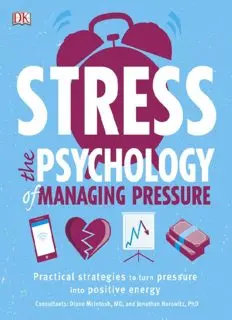
Stress: The Psychology of Managing Pressure PDF
Preview Stress: The Psychology of Managing Pressure
CONTENTS FOREWORD CHAPTER 1 STRESS IN PERSPECTIVE HOW STRESS AFFECTS YOUR BODY AND MIND What is stress? What it is, and what it isn’t Naturally stressed A necessary part of life Can stress be good for us? A boost to the system Acquiring resilience Bend but don’t break The body’s alarm system The physiology of stress Identify your stressors Finding the problem spots Coping mechanisms Getting some control Stressed by nature? Personality and pressure Taking it like a man? Men, women, and stress Perfectly imperfect The relief of realistic standards Self-compassion Becoming your own comforter Writing it out Keeping a stress diary Am I worth it? Stress and self-esteem Finding meaning Making stress worthwhile Feeling in control Understanding our limits Breaking the worry cycle Dealing with uncertainty De-stress your thinking The power of CBT How stressed? Between discomfort and danger CHAPTER 2 A CONSTANT COMPANION STRATEGIES FOR DEALING WITH LONG-TERM STRESS Pressures of today Is life more stressful than ever? Tackling technostress Coping in the digital age Balls in the air The stress of multitasking Mirror, mirror Body issues Secure in love? Stress and relationships Not tonight, honey Sex and intimacy Pressures of parenthood Creating a calm home life In the workplace Pressure to perform Job burnout Knowing when to stop The pressure to spend Managing your money Money worries Surviving debt and insecurity Assert yourself Learning to draw the line Speaking up Asking for what you want Stop crowding me! Coping with busy spaces In green places The time-honored cure of nature Music and silence The ear as healer Stress and older people Growing old gracefully Always there for you How to be a stronger caregiver Letting things go The power of forgiveness Giving thanks How gratitude can lower stress CHAPTER 3 STRESS IN THE MOMENT TROUBLESHOOTING TACTICS FOR SHORT-TERM STRESS Turning points Stress in times of change The big day looms Handling performance anxiety At odds with others Managing the stress of conflict I can’t stand it! How to deal with frustration When love ends Breakup and divorce Life after loss How to deal with bereavement Learning to face facts Acceptance and commitment Breathe in, breathe out Breath control remedies Learning to loosen up Progressive Muscle Relaxation Take a moment Mindfulness and meditation Let’s celebrate Making holidays less stressful I need a drink Stress and alcohol Avoiding avoidance How to stop stress ruling you Staying well Stress and ill health CHAPTER 4 DE-STRESSING YOUR LIFE CREATING A CALMER EXISTENCE Too much on your plate How to prioritize Balancing act How to juggle work and home Why free time counts The value of leisure Fighting fit The role of exercise The walking cure How to de-stress with a stroll Mindful movement De-stressing with yoga and tai chi Stress and food Eating under pressure A good night’s sleep Beating insomnia The simple life Decluttering home and habits Strong enough How to manage your willpower Resisting old habits Staying firm under pressure Total immersion The art of finding flow The human safety net Friendship and support Positive talk The benefits of avoiding complaints Seeing the funny side The role of humor Get creative Beating stress with arts and crafts The power of pets The calming effects of animals All on your own? The stress of loneliness The art of grit Persistence and passion CHAPTER 5 RESILIENCE AND RESOLUTION FINDING SUPPORT AND BUILDING STRENGTH I don’t feel well The physical symptoms of stress Big bad wolf Overcoming an abusive childhood Taking care Mental illness facts and fiction Under a gray cloud Low mood and depression Managing fears Four anxiety disorders Lifeboat ahoy Could a therapist help? Holding steady Living a resilient life Sources and bibliography Acknowledgments Copyright FOREWORD A ge, race, gender, money—nothing can shield us from having to face stressful situations that might feel difficult, even impossible, to overcome. Nor should they, because stress is an essential part of life. Any experience or situation that makes you feel threatened or overwhelmed is a “stressor.” Good stress helps you to focus on your goals and complete important tasks. Without stress, we would fail to achieve our greatest accomplishments, because the ones we value most are usually stressful and require a great deal of effort. Bad stress isn't productive and can halt your advancement and dampen your spirits. This book will help you master life's stressors, good or bad, with greater ease—not by eliminating stress, but by building on your strengths and encouraging the development of new coping skills. The five chapters that follow are based on a careful review of the most recent and important scientific research, which has been translated to be relevant and helpful for anyone who wants to feel better able to manage their stress. When you’re trying to overcome life’s challenges, particularly the more stressful or unpleasant ones, understanding how your body and your brain react, and how you can influence that reaction, can help you to feel a greater sense of control. Chapter 1 focuses on just that, by defining stress and explaining how your body reacts physically and emotionally to scary situations. These pages will help you determine why you feel stressed, which is the first step toward taking control. We all have our own ways of dealing with stress, but there are some simple yet powerful proven coping techniques—and by understanding their pros and cons, you will be able to choose the strategy that's right for you. How you manage stress must work for you, so that you can develop a realistic, practical plan that fits your own needs. In Chapter 2, you'll see that you are not alone in feeling stressed when
